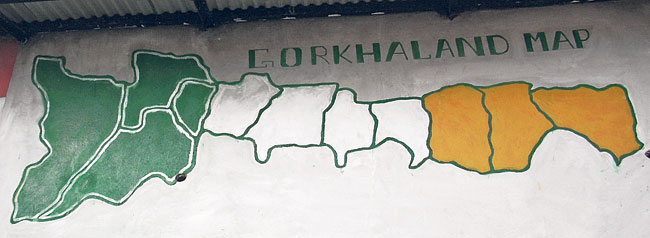DARJEELING, July 15: Rapid formation of ‘development board’ on the basis of ethnic groups in the Darjeeling hills by the Western Bengal government has quite alarmed Gorkhaland supporters. The move is being seen and interpreted by them as a well conceived plan to abort the Gorkhaland movement.
Mamata Banerjee, chief minister of West Bengal recently announced formation of development board of scheduled castes - Kami, Damai and Sarki. Prior to this, she had formed similar development boards for Bhutia, Limbu, Khumbu, Sherpa, Rai, Tamang, Lepcha and Magar ethnic groups. Forming such development boards for specific ethnic groups in the name of development has been viewed as a strategic move of the government to divide the ethnic Nepali community and deviate it from its decade-long demand of an autonomous Gorkhaland.
“This is a move to bring division among those demanding separate Gorkhaland. We need to be very careful about it,” commented Binaya Tamang, vice secretary of Gorkha Janamukti Morcha (GJM). “Banerjee has done that earlier also. And now on the occasion of Bhanubhakta’s anniversary she has added more of such boards. It is really alarming. I urge all Gorkhaland supporters to remain on their guard and to desist from deviating from our original demand of autonomous Gorkhaland,” he said while talking to media.

Three more killed in Gorkhaland movement

[A hand-drawn sketch of the proposed autonomous Gorkhaland in this file picture from 2012.]
He termed the announcement as ironical claiming that Banerjee’s government rolled out ‘divisive boards’ for the Nepali speaking people on the day when they were celebrating a person’s birthday, who is regarded as symbol of unity among Nepali language speakers all over the world. “Bhanu Bhakta Acharya contribution to Nepali language is immense. Celebrating his birthday means celebrating the unity among Nepali speakers. But the government tried to divide this unity by forming boards along ethnic lines on the very day of his birth. It’s a conspiracy.”
Tamang further expressed dissatisfaction over the changed terminology in referring to the Gorkhaland movement. During Gorkhaland agitation, the agitators, the state government and the central government had agreed to form ‘Gorkhaland Territorial Administration’ (GTA), Tamang said. However in the recent correspondences, the government has removed ‘land from the word Gorkhaland, he said adding that it was a conspiracy on the government’s part to neutralize the significance of the word. “The government now calls it only Gokha, instead of Gorkhaland. Removal of ‘land’ from the word ‘land’ signifies the intention of the government to suppress our demand for a autonomous Gorkhaland. It’s not fair,” he said.
A team including Chief of GTA Bimal Gurung had reached out to Banerjee demanding public holiday in the state on Bhanubhakta’s birth anniversary and Buddha Jayanti. “But she refused to do so,” said Tamang. “In addition, no Nepali speaker was allowed to put their views during the event organized for marking Bhanu Jayanti. It is very humiliating and a grand conspiracy to snatch away our heritage, our pride, our Bhanubhakta and blur our identity,” he added.
On Wednesday, as Benarjee and President of India Pranab Mukharjee were visiting Darjeeling for the event, a youth group All India Gorkha Unity Campaign organized rallies and distributed pamphlets and posters that demanded establishment of Gorkhaland. Some posters called for stopping ethnic division and demand for Gorkhaland. Several groups and Nepali language associations had come to fore pressing for the issue.
“However, the government is making cunning moves. It is trying to weaken us through different methods,” noted Karna Thami, coordinator of the event. “Even though it is not bad thing in itself to form development boards, it is clear what the development boards formed along ethnic lines are aimed at,” he added.
Nepali speaking community in India has been demanding autonomous Gorkhaland state since 1974. Since then, the community has taken to street time and again. During general elections, the issue gets attention from national parties like BJP and Congress.
However, so far, the dreams of thousands of Nepali-origin people in India have remains unfulfilled, Some of these claim that there have been serious weaknesses on the part of those who led the movement. It is felt that the tendency of falling weak or getting lured by the state force has hit the movements. Formation of the GTA is also criticized as an example of such weakness in the movement’s leadership, locals argue.
Locals feel that that the government has always tried to simmer down the Gorkhland agitation by bringing division among the leaders and the recent move of the government to form development boards along ethnic lines, they feel, will further erode the unity among the movement’s leaders.





_20240730132124.png)
































